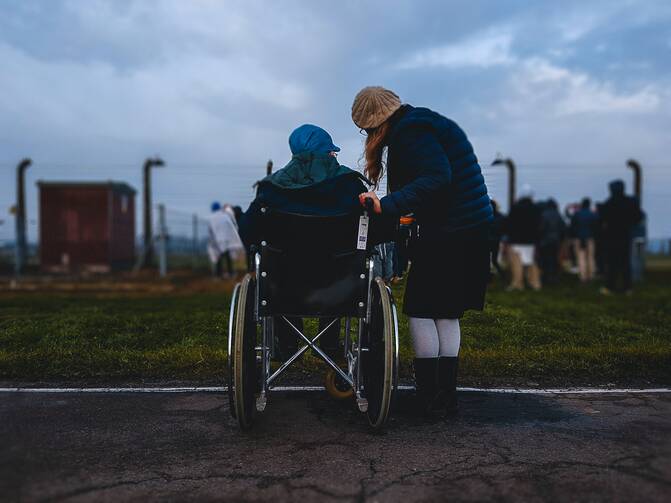The biblical call to confront ableism
The St. Francis Borgia Deaf Center of Chicago offers Masses in total communication, meaning they are fully spoken and signed. Deaf lectors, cantors and eucharistic ministers support liturgies and fully participate in the worshiping community. The center enables deaf, hard-of-hearing and hearing members of the community to experience Mass together, creating a welcoming and interactive faith community. A member of the community shared his experience as a Catholic, saying that the church is the church of the hearing, but at St. Francis Borgia, he has found inclusion and belonging. St. Francis Borgia and similar parishes that offer total communication Masses serve an important role by making the church more open and available for all people.
“When you hold a banquet, invite the poor, the crippled, the lame, the blind” (Lk 14:13).
How can the church better respond to the diverse needs of the community of faith?
What can you do to better understand, appreciate and include people with diverse needs?
What can we do to create a sense of belonging for all people in the church and world?
In the Gospel for the Twenty-second Sunday in Ordinary Time, Jesus reflects on the kingdom of God. While the kingdom is not explicitly named in the parable, it is compared to a great dinner. Jesus describes people being invited to a banquet, and he says to the Pharisees with whom he meets that when they host an event, they should not invite friends, family and rich neighbors. Instead, people who lack financial means, people with physical differences and difficulty walking and people with sight impairment should be invited. These groups, those called “poor, crippled, lame and blind,” symbolically represent all who are unable to repay an invitation to the party. The friends and wealthy people represent those with means and access to resources.
Jesus envisions the kingdom of God as a place for all people. The symbolic dinner in the Gospel represents an open invitation where all are invited. Jesus’ vision of the kingdom of God is instructive and should inspire us to avoid ableism which privileges people who are considered able-bodied. Rather, in order to build the kingdom on earth, we should work to create a church and world that is open and accessible to all, recognizing overt and covert ways that people with differences and disabilities have been excluded from full participation in the community of faith. The Gospel calls on us to recognize and appreciate the diversity that exists in our church and world and create space for all people to flourish. In addition, the Gospel allows us to think about ourselves more thoughtfully, remembering that even those who are considered able-bodied also rely on help and support to thrive.
The Lectionary shortens Luke 14:1-14 by focusing solely on the banquet. Just before Jesus shares his parable, he has an encounter with a man with a medical condition that causes fluid retention. Jesus heals the man on the sabbath, which is sometimes critiqued in the Gospels, although not on this occasion. By healing the man with dropsy (edema), Jesus recognizes the man’s suffering and addresses it by offering loving assistance and relief. Reflecting on the parable alongside a healing story, we find two concurrent approaches to responding to people’s diverse needs: creating spaces that are accessible and give opportunities for all people, yet also recognizing people in need and being ready to offer help and support.
Also within today’s Gospel, Jesus reiterates a theme that we have encountered over the past few Sundays: “For every one who exalts himself will be humbled, but the one who humbles himself will be exalted.” Jesus once again reveals his interest in building a community of disciples who can live out the Gospel message of love. Jesus is mindful of not letting their selection be interpreted as elevating the disciples above others in the community. Jesus’ call to humility is important for all of us today, especially those in positions of authority and power.








